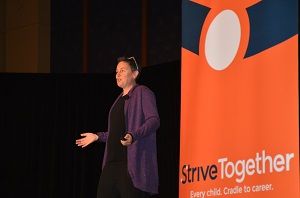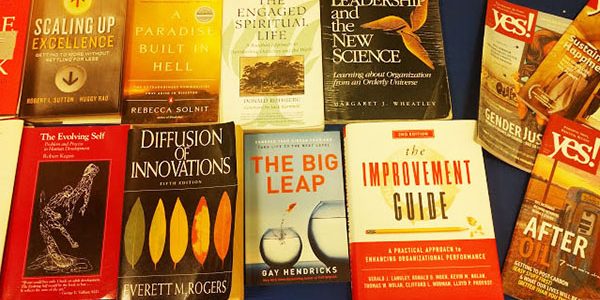Earlier this month, Parv Santhosh-Kumar and I had an incredible opportunity to gather together with 35 social sector leaders and spend three days at the Skid Row School for Large-scale Change. The experience was transformative.

For one, it came at the end of what has been a year filled with high highs and low lows. I think that we can all probably relate to this. Just when you feel like you’re making progress, you turn on the news and realize there’s so much more work to be done. So needless to say it was quite therapeutic to be able to spend time with like-minded professionals, each seeking to make the world a better place, and commiserate about our successes and failures on our respective journeys.
Next, similar to the StriveTogether approach, the leaders of the Billions Institute and the Skid Row School faculty put together a curriculum that forces participants to address both the adaptive and technical aspects of leading social change. We heard Becky Margiotta (keynote speaker at the 2016 StriveTogether National Convening and co-founder of the Billions Institute) share lessons learned from her work to combat homelessness on the 100,000 Homes Campaign, Joe McCannon (co-founder of the Billions Institute and former vice president at the Institute for Healthcare Improvement) share his work to improve patient safety on the 100,000 Lives Campaign and Nana A.Y. Twum-Danso (founder and CEO of MAZA) discuss her work to reduce infant mortality in Ghana as part of the Project Fives Alive! Campaign.
Dan Heath (2015 StriveTogether National Convening keynote speaker and co-author of Switch) provided individual coaching on getting super clear about our intervention to help mobilize others to care about the change we are trying to make and change their behavior as a result. And lastly, Christine Margiotta (executive director of Social Venture Partners Los Angeles) pushed us to uncover some of the “unspeakable invisibles” — such as fear of failure, scarcity mindset, indecision, overreliance on consensus and running on overwhelm — that exist in all of us and keep us from creating the change we want to see.
To try and distill my learning from the three-day school into some key takeaways was not an easy task, so I’m sharing a few key nuggets today and you can expect to see more from us as we incorporate our learnings into the everyday work we do with the Network:
1. If you want to spark change, feeling is the fuel. We have to generate interest in our mission to motivate behavior change. We cannot allow process to be the albatross. Most people are not motivated by static data charts. We have to match the rigor of our improvement approach to get results with an equal effort to motivate, mobilize and do a better job of telling the story about the impact on kids. That’s what humans care about. In Switch speak, this is what “motivates the elephant.”
2. Smart aims are like unicorns. Very rarely do organizations have quantifiable, time-bound objectives or aims like ours — five proof point communities (with measurable outcomes improving and evidence of systems changing) by June 2018. To set a smart aim, you have to first understand what complete success looks like for you, understand where you are in the expansion process and then set a specific time-bound goal for the next 18-36 months. As long as you are tight on aims, you can afford to be loose on everything else.
3. When you operate in fear, everything rustles. One of the primary reasons organizations and individuals do not set smart aims is because of fear. Fear often leads to blame, criticism and self-doubt. In order to do this work, according to the Billions Institute’s Model for Unleashing, you must be willing to “hug the bear,” or confront your fear head on, unpack what’s behind it and embrace failing forward.
4. Amateurs talk strategy, leaders talk logistics. Joe and Becky of the Billions Institute posit that achieving large-scale change requires organizations to operate Inside the Command Center. Teams who operate in this way put it all together — they get clear on their intervention and their aim, they embrace fear head on, they don’t get hung-up on business as usual, they do exactly what it takes to achieve results.
We look forward to continued partnership with organizations like the Billions Institute and other graduates of the Skid Row School for Large-scale Change. Changing systems to change the world is some pretty big work. We are fortunate to have great partners to learn from and grow with along the way.







